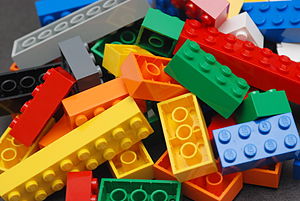 Image via Wikipedia
Image via WikipediaExtra-curricular events, clubs and teams are rare for children with disabilities. At least, they are here in Indianapolis. So when a friend came to me with a study about LEGO and its benefits to children on the spectrum, it seemed a good fit. The problems soon became apparent.
Problem One: You need Legos. Lots of them. My first source was Wal-mart. Go to your local store and fill out a simple form telling them what you're needing and why. They've funded us two years running. This year we also obtained some stimulus of our own for the club. That will keep us going for a while.
Problem Two: This one you will not believe, but staff were semi-resistant to the club. I'm speculating as to the cause, but I think it may be related to our habit of lowering our expectations for "those"kids. Lower goals not expectations. The fact is that autistic kids have an affinity for systems. Lego is a building system. It's the same reason so many like math.
Problem Three: RLC is a facility with students from both ends of the spectrum, and every disorder under the sun seems to occupy its halls. That makes for a problem I still haven't fully solved. High and low functioning students at the same event. One thing I've learned is that the kids can and will let you know where their talents lie. I can say with certainty that social skills training was accomplished.
To parents, I say: If you have time and ability to share, starting recreational groups for children with disabilities is the best way to go. Kids need these kinds of experiences. They need the opportunity for play, for conflict, for self-regulation. We all learn these things the same way, experience. The learning and mentally disabled need more experiences than the rest of us, not less. Whatever you do, keep your child in the game. Don't let them retreat from the world.
![Reblog this post [with Zemanta]](http://img.zemanta.com/reblog_e.png?x-id=355a2ff2-07d8-4923-a2ca-dec6c777dc6a)